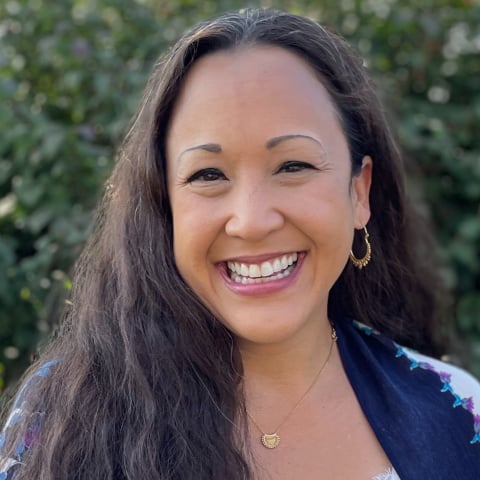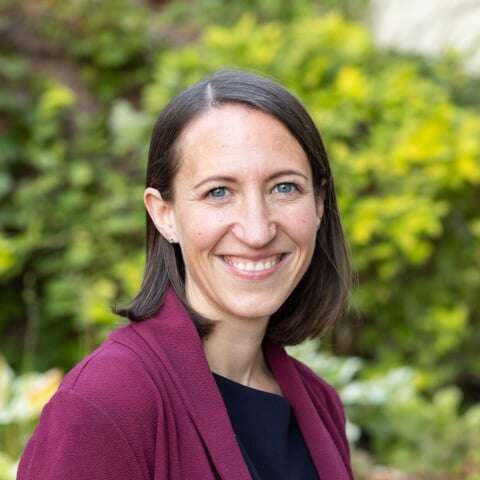Blog
Search Institute Spotlight: Meet Dr. Kara Hirano
Dr. Kara Hirano is a Research Scientist at Search Institute, specializing in applied mixed methods research and the practical translation of findings to improve outcomes for young people and their families. With a Ph.D. in Special Education and an M.Ed. in Couples and Family Therapy, Kara brings extensive expertise in fostering positive youth development and strengthening connections between young people, their families, and the systems that support them. Kara is passionate about fostering equitable access to strong, meaningful relationships, and values Search Institute’s commitment to helping all adults recognize their vital role in promoting positive youth development.
We know how important relationships are between youth and the adults in their lives, but the relationships between youth-serving workers and parenting adults also impact young people. How does strengthening relationships with families influence youth wellbeing and long-term success?
Strong relationships between youth workers and parenting adults are key to supporting young people’s growth. Because each adult sees the youth in different settings, they often notice different strengths, interests, and challenges. When they share these insights appropriately, they gain a fuller picture of the young person—helpful both in celebrating successes and addressing concerns.
For example, if a youth worker notices a child becoming especially engaged in the music lab, encouraging the child to share this interest at home—or asking permission to do so—can help the parent nurture that passion outside the program. Similarly, if a young person is struggling with math during the afterschool program, communicating with the parent can lead to additional support from the school or at home.
These connections help "close the loop" between the program and home, leading to better outcomes for youth and stronger family trust. Parenting adults can also act as protectors and gatekeepers. When a program builds a relationship that keeps families informed, values their role, and offers a clear point of contact for communication and collaboration, families are more likely to stay engaged—and to keep their child in the program long term.
You have a diverse background regarding youth wellbeing, including experience as a family therapist. How does this impact your work at Search Institute?
My training as a family therapist fundamentally shaped how I understand people, behavior, and relationships. I still remember learning about family systems theory and how deeply it resonated with my lived experience—far more than my earlier training. That moment confirmed my path toward a degree in couples and family therapy.
This systems-based worldview continues to influence my work at Search Institute in a couple ways. First, I care deeply about the human experience and am committed to contributing to practices and approaches that promote wellbeing. I see people as interconnected, which makes me especially drawn to projects that consider relationships at multiple levels—between youth and caregivers, youth and teachers or afterschool staff, and among the adults who support them.
Second, I naturally think in terms of systems—home, classroom, school, district, program, or community. I enjoy working across these levels to identify different levers for change. Because of my work with families, I also see them as central to youth development. So, whenever we’re thinking about how to support youth thriving, I instinctively bring families or other caring adults into the conversation. From my perspective, they’re always part of the picture.
Most recently, you’ve been working on Developmental Relationships for Students with Learning Differences, a project funded by the Oak Foundation. Can you share highlights discussing what you’ve learned so far?
Through our partnership with two high schools in the northeast, we've gained valuable insights into what strong developmental relationships look like for students with learning differences. One key takeaway is that these students want to be known by their teachers—not just as learners in the classroom, but as whole people.
For students with learning differences, being known academically means more than having a teacher who has read their individualized education plan (IEP) or 504 Plan. It means having a teacher who actively implements their accommodations and shows a genuine investment in their learning—by checking in when they’re struggling and adapting their teaching to help the material make sense.
Equally important, students want their teachers to understand what’s happening in their lives beyond school. They may be juggling caregiving responsibilities, work, a heavy course load, extracurriculars, or family stress. When teachers know this context, students perceive that teachers are better equipped to offer compassion, flexibility, and trust. Students want to be believed when they ask for an extension or share that they’re overwhelmed, not seen as making excuses or lacking motivation.
What we’ve heard consistently is that these actions—being responsive, adapting instruction, and showing personal interest—are not just ways of “knowing” students, but core expressions of care. From some students, we heard that above all else, being known in these ways must come first—before any other effort to strengthen relationships can truly be effective.
What are your favorite activities on your days off?
Spending time with my family is always the highlight of my day. On weekends at home, we enjoy talking, playing games, watching movies, going for walks, and spending time outside with our two dogs. We also love weekend adventures like visiting the coast, hiking to beautiful waterfalls, and discovering new restaurants and bakeries.
Projects Dr. Kara Hirano has contributed to include Spiritual Thriving in African American, Latino/Hispanic, and Low-Income Families: Reimagining Messages and Tools for Change, Keep Connected 360: Transforming Middle School-Family Relationships through a Relationship-Centered, Tiered Approach, and Developmental Relationships for Students with Learning Differences. She has also worked closely with Big Brothers Big Sisters of America on resources to strengthen partnerships between mentoring programs and families.


